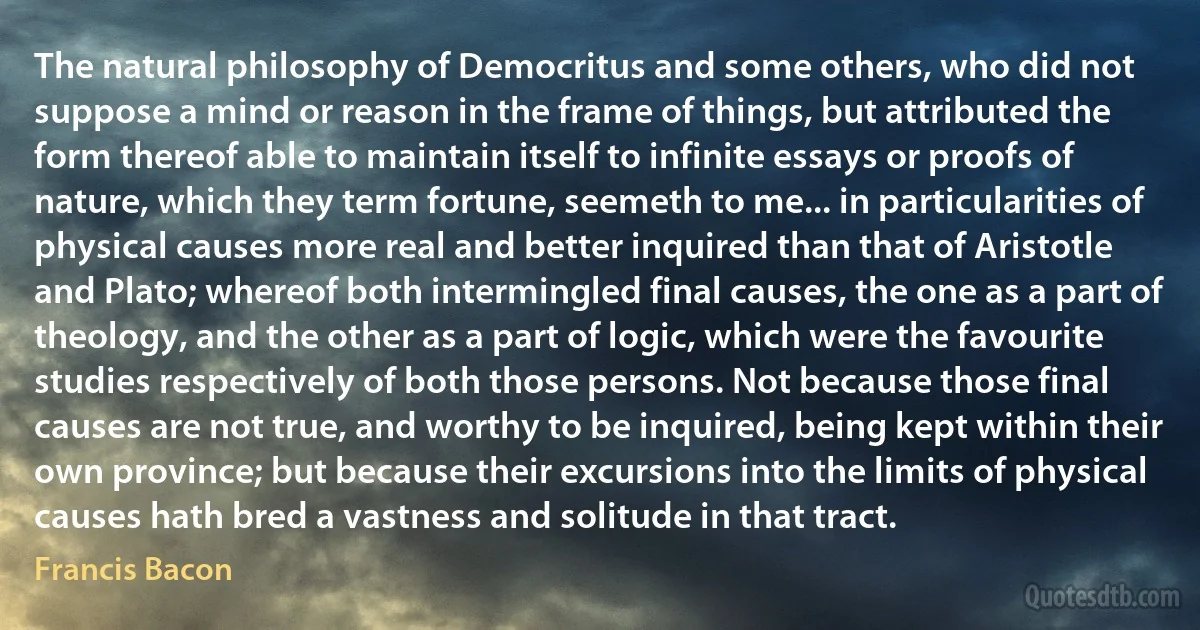
The natural philosophy of Democritus and some others, who did not suppose a mind or reason in the frame of things, but attributed the form thereof able to maintain itself to infinite essays or proofs of nature, which they term fortune, seemeth to me... in particularities of physical causes more real and better inquired than that of Aristotle and Plato; whereof both intermingled final causes, the one as a part of theology, and the other as a part of logic, which were the favourite studies respectively of both those persons. Not because those final causes are not true, and worthy to be inquired, being kept within their own province; but because their excursions into the limits of physical causes hath bred a vastness and solitude in that tract.
Francis BaconRelated topics
able breed final form fortune frame mind natural nature province real reason suppose theology tract vastness worthy others aristotle things democritusRelated quotes
Let true Christians then, with becoming earnestness, strive in all things to recommend their profession, and to put to silence the vain scoffs of ignorant objectors. Let them boldly assert the cause of Christ in an age when so many, who bear the name of Christians, are ashamed of Him: and let them consider as devolved on Them the important duty of suspending for a while the fall of their country, and, perhaps, of performing a still more extensive service to society at large; not by busy interference in politics, in which it cannot but be confessed there is much uncertainty; but rather by that sure and radical benefit of restoring the influence of Religion, and of raising the standard of morality.

William Wilberforce
Don't forget that God sees you and watches you when you are in pain; He perceives even the beating of your heart. Consequently, He will not leave you without consolation and His fatherly protection. Naturally, the saints rejoiced in their afflictions; as for us, let us at least manage to accept affliction or pain patiently.
My child, pray within your heart, and the name of Jesus will become for you a comforting balm so that you can bear this trial of yours in a way which benefits you. You will greatly benefit from this trial if you submit yourself to it patiently. So again I say to you, with the almighty armor of prayer continually approach the omnipotent Lord more often, and you will come to know how He wondrously lifts the burden of pain and marvellously gives rest to sufferers.

Ephraim of Arizona
To quote the words of Timaeus, in Plato, "What is that which always is, and has no birth, and what is that which is always becoming but never is? The one is apprehended by the mental processes, with reasoning, and is ever the same; the other can be guessed at by opinion in company with unreasoning sense, a thing which becomes and passes away, but never really is."
Therefore, if we crave for the goal which is worthy and fitting for man, namely happiness of life-and this is accomplished by philosophy alone and nothing else, and philosophy means... for us desire for wisdom, and wisdom the science of the truth of things... it is reasonable and most necessary to distinguish and systematize the accidental qualities of things.

Nicomachus
I am almost amazed that you consider a professional philosopher capable of no confusion in concepts and definitions. Such things are nowhere more at home than among philosophers who are not mathematicians, and Wolff was no mathematician, even though he made cheap compen- diums. Look around among the philosophers of today, among Schelling, Hegel, Nees von Esenbeck, and their like; doesn t your hair stand on end at their definitions? Read in the history of ancient philosophy what kinds of definitions the men of that day, Plato and others, gave (I except Aristotle). But even in Kant it is often not much better; in my opinion his distinction between analytic and synthetic theorems is such a one that either peters out in a triviality or is false.

Carl Friedrich Gauss
There is a school of Philosophy still in existence of which modern culture has lost sight. Glimpses of it are discernible in the ancient philosophies with which all educated men are familiar, but these are hardly more intelligible than fragments of forgotten sculpture,-less so, for we comprehend the human form, and can give imaginary limbs to a torso; but we can give no imaginary meaning to the truth coming down to us from Plato or Pythagoras, pointing, for those who hold the clue to their significance, to the secret knowledge of the ancient world. Side lights, nevertheless, may enable us to decipher such language, and a very rich intellectual reward offers itself to persons who are willing to attempt the investigation.

Alfred Percy Sinnett
